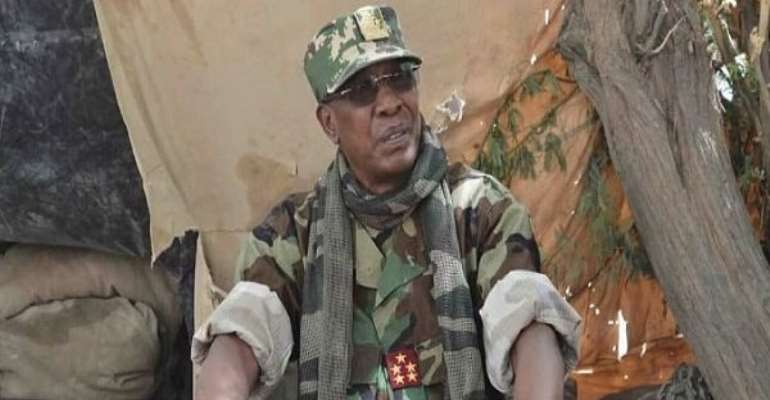Again, Deby’s Death Deepens Transition From Father To Son Leadership In Africa

There is no denying the fact that since the idea of democracy was sold to Africans by the colonial powers that ran the continent until the period of decolonization began in the 1960’s that Africa has by each passing political dispensation in each country it is constituted being an attemptingy in futility to follow the European model of democratic governance. However, whilst African democracy has shown some improvement in some few African countries within the continent, it has continually been having legitimacy problems, particularly as some African states are ignobly characterized by corruption and imposition of leaders; to the extent of having family members or kinsmen imposed in power.
For the sake of clarification, the news that inspired this piece is that Idris Deby who was the President of Chad, and who ruled the country for more than 30 years and was an important Western ally in the fight against Islamist militants in Africa, has been killed on the frontline against rebels in the North.
The angst of this writer in this context is that Deby's son, Mahamat Kaka, in less than a day of Deby’s demise has been named interim president by a transitional council of military officers. Against the foregoing backdrop, permit me to sound personal and condemn Africa’s democracy for being characterized with the transition from father to son leadership.
It would be recalled that Deby, 68, came to power in a rebellion in 1990 and was one of Africa's longest-ruling leaders, surviving numerous coup attempts and rebellions. Paradoxically, his death was announced the day after he was declared the winner of a presidential election that would have given him a sixth term in office. It was gathered that most of the opposition, which had long complained of his repressive rule, boycotted the vote.
The foregoing democratic aberration is not in any way novel in Africa. For instance, shortly after the announcement that Gnassingbe Eyadema, the former president of Togo was dead, the armed forces chief of staff said on state media in Lome, the country’s capital, that his son, 39-year-old Equipments and Postal Services Minister, Faure Eyadema was Togo's new leader. He said the armed forces had been confronted with what he called a power vacuum. He explained that under the constitution, the parliament speaker was supposed to take over, but the army chief of staff said he was out of the country. Ostensibly to preempt protests as a result of the undemocratic imposition, the Land, sea and air borders were closed until further notice.
In a similar reprehensible vein, former first lady of Zimbabwe, Grace Mugabe, reportedly told a powerful bloc in the ruling Zanu-PF party that she was already the president of the country because she ‘plans and does everything with President Robert Mugabe.’
As also gathered, a leader of the Zanu-PF women’s league, Angeline Muchemeyi, was quoted to have stated that Grace said she was not interested in the post of vice president as was earlier reported as plans continued as to who succeeds the 92-year-old Mugabe.
The then First Lady said “I’m the wife of the president, I’m the president already … I plan and do everything with the president, what more do I want, for now the position of the women boss is enough,” Muchemeyi said.
I'm the wife of the president, I'm the president already … I plan and do everything with the president, what more do I want, for now the position of the women boss is enough.
Grace Mugabe, who at the time led the women’s league of the party was seen as a strong contender to replace the husband as the president of Zimbabwe.
However, Zimbabwe’s two vice presidents at the time, Phelekezela Mphoko and Emmerson Mnangagwa, were named as other possible successors. As gathered, Mugabe in his lifetime has repeatedly criticized intra-party jostling to take over his job.
Speaking to a group of war veterans, Mugabe announced a time line for his resignation whilst admitting that the country’s economy was crumbling. The southern African country’s currency was in poor shape and banks running out of cash, the country was also feeling the pinch of a crippling drought.
However, the ruling party confirmed that Mugabe will be contesting the country’s election that was conducted in 2018 and to that end was re-elected.
It would be recalled that Mugabe was the only President Zimbabwe have ad had for more than three decades until his demise.
Mugabe was quoted to have said “As long as the party says continue, I continue…If I still have the energy, I still have the life, the blessings of God, I will continue.”
At this juncture, it is not an exaggeration to conclude that political observers in other continents while discussing on the spread and prospects of democracy in Africa that they often depict the continent as less democratic, indeed undemocratic. Africa is seen by its critics as ridden with dictators, monarchies and dynastic rulers. Of course, such image does not speak well of Africans as a whole. To me, it is high time the African Union (AU) wakes up from its slumber, and literarily clean up this reprehensible continental image.
